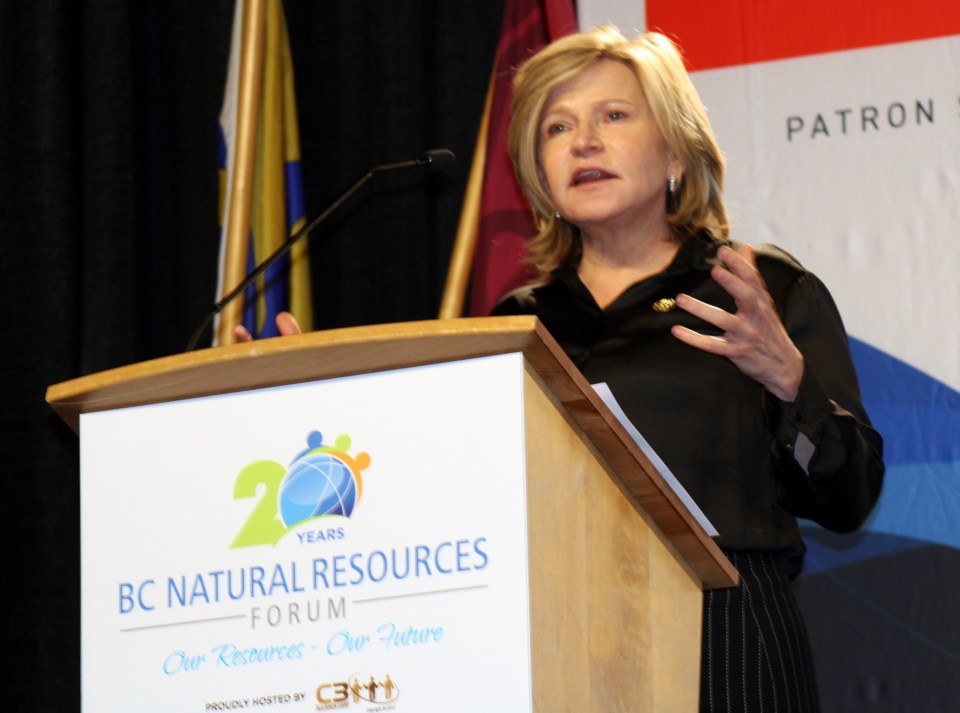Canadian National Railway president and CEO Tracy Robinson pulled into the Prince George station Thursday in her high-res jacket and put the word out early in her speech at the BC Natural Resources Forum that her company is hiring.
If anybody in the forum crowd had ambitions to become a locomotive engineer, Robinson had the perfect recruiting tool right next to her in the lobby of the Prince George Civic and Conference Centre - a video simulator complete with throttle and brake levers to show exactly what it’s like to drive a train.
If only she had the power to eliminate those supply-chain bottlenecks that tie up freight shipments in port facilities.
Robinson doesn’t have all the answers, but she does know Canada’s largest railway is also its busiest, hence the need for more workers.
Prince George is home to 600 of the nearly 1,000 CN employees in northern B.C., and Robinson acknowledged the role the city plays as an important terminal for freight connecting to markets in all directions, whether it’s trains carrying containers of cargo from the port in Prince Rupert or rail cars full of lumber and sawmill chips destined for Prince George mills.
“On the railway we like to say if you wear it, if you use it, if you drive it or you eat it, chances are we moved it, and it probably went through British Columbia,” said Robinson, a former Canadian Pacific Railway employee appointed to her role with CN last February after seven years as an executive at Trans Canada Energy.
“At CN we take seriously our purpose, to power to grow the Canadian and North American economy in its entirety, but also for its industries individually and we do that, providing thousands of customers across every industry with transportation from local markets and markets around the world.”
CN has a network of 30,000 kilometres of track and more than 50 per cent of the business it does goes through Western Canada.
“It’s driven by the forestry sector,” Robinson told the crowd. “At CN we carry more forest products on our railroad than any other railroad in North America and most of that comes from this area in Prince George and the area across northern B.C.
“This railroad is driven by coal and other mined products taken to other markets around the world. It’s driven by grain and potash that move through B.C. on their way to global markets. It’s driven by all kinds of energy, refined fuel, crude oil and jet fuel.”
CN reported record profits in the third quarter of 2022 and in those three months revenues jumped by $922 million to $4.5 billion, a 26 per cent improvement over the previous year.
Robinson said the company has continually made infrastructure upgrades over the past 11 months that have reduced shipping times, increased reliability and improved safety of the railroad. Since 2017, Robinson CN has invested nearly $2 billion in B.C.
“Earlier this month we celebrated an important event, we passed two years without a fatality at CN,” said Robinson. “There is nothing more important than sending our people home every day. We’re almost at the same milestone, nearly two years without a serious injury.”
While CN executives continue to try to hash out how to improve the flow of freight from the port in Vancouver, Robinson said Prince Rupert holds more opportunity for material growth in the north.
“The port in Prince Rupert over the past decade has emerged as a powerhouse to be reckoned with,” Robinson said. “That story’s really just begun. Rupert had $60 billion of trade going through it in 2021 and is generating $1.4 million of economic activity in northern B.C.
“It’s the shortest sailing time to Asia, it’s the deepest natural harbour in North America and it connects to our network, which means it can get products anywhere across Canada and the United States. It facilitates our access to the Asian markets.”
Propane shipments that originated from CN tracks are heating homes and powering businesses across Asia and wood pellet exports have increased from 500,000 tonnes in 2014 to 1.5 million tonnes last year. Intermodal traffic also increased to 1.2 million containers last year.
“We want to invest to expand our capacity,” said Robinson. “That means longer sidings, it means reinforcing the bridges and hardening our infrastructure and it means more investment in cars and locomotives and in technology to ensure we continue to advance the safety of our operations and our efficiency.
“It’s going to mean more people, more permanent jobs in communities along our line, with good pay, strong benefits and more support for the communities along our route.”



